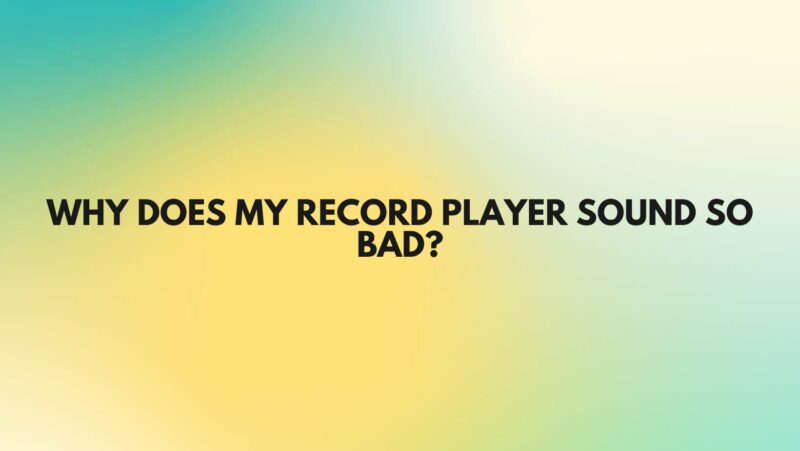Vinyl records have a unique charm, offering a tangible connection to the music and a warm analog sound. However, there are times when a record player’s performance may not meet expectations, leaving you with a less-than-pleasant listening experience. In this comprehensive article, we will explore common reasons why your record player may sound bad and provide troubleshooting steps to help you identify and resolve the issues, restoring the joy of vinyl playback.
Common Issues and Their Causes
- Excessive Surface Noise:
Cause: Surface noise, including clicks, pops, and crackles, can be caused by dust, dirt, or static on the record surface. It can also result from damaged or poorly maintained stylus (needle) and records.
Solution:
- Clean your records using a high-quality record brush or a record cleaning machine.
- Ensure your stylus is clean and undamaged. Replace it if necessary.
- Handle records with care to avoid scratches and damage.
- Distorted Sound:
Cause: Distorted sound can be caused by incorrect turntable setup, including tracking force, anti-skate, and azimuth adjustments. It can also result from a misaligned cartridge or a worn stylus.
Solution:
- Verify and adjust the turntable setup according to the manufacturer’s instructions.
- Ensure proper alignment of the cartridge and replace the stylus if it’s worn.
- Check for any obstructions or damage to the tonearm.
- Low Volume or Weak Output:
Cause: Low volume can result from a variety of issues, including a defective or poorly matched phono preamplifier, a damaged or old cartridge, or a malfunctioning amplifier.
Solution:
- Verify that your phono preamp is functioning correctly and matched to your cartridge type (MM or MC).
- Check the cartridge and stylus for damage and replace if necessary.
- Inspect your amplifier for any issues and ensure all connections are secure.
- Inconsistent Speed:
Cause: Inconsistent playback speed, such as fluctuating pitch or wow and flutter, can be caused by a worn or malfunctioning belt or motor in the turntable.
Solution:
- Replace the turntable belt if it’s worn or damaged.
- Inspect the turntable’s motor for issues and consider professional servicing if necessary.
- Imbalanced Sound:
Cause: Imbalanced sound can result from poor speaker placement, issues with the amplifier, or unequal tracking force and anti-skate settings on the turntable.
Solution:
- Experiment with speaker placement to achieve better balance in your listening environment.
- Ensure that your amplifier is functioning correctly.
- Adjust the tracking force and anti-skate settings on your turntable for balance.
- Feedback and Vibration:
Cause: Feedback and vibration can occur if the turntable is placed too close to speakers, on an unstable surface, or in a location with excessive external vibrations.
Solution:
- Relocate the turntable to a stable, vibration-free surface.
- Ensure the turntable is not placed too close to speakers or other vibrating equipment.
- Electrical Interference:
Cause: Electrical interference can introduce unwanted noise into your vinyl playback, often caused by the proximity of electronic devices, poor grounding, or damaged cables.
Solution:
- Keep your turntable away from electronic devices and appliances that may cause interference.
- Ensure that the turntable and phono preamp are properly grounded.
- Inspect and replace damaged cables and connectors.
Conclusion
A record player that sounds bad can be frustrating, but with a systematic approach to troubleshooting, you can identify and address the issues that may be affecting your vinyl listening experience. By following the recommended solutions for common problems, you can enjoy the full richness and warmth of vinyl records, ensuring that every spin brings you closer to the authentic and captivating world of analog sound.


